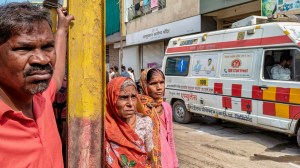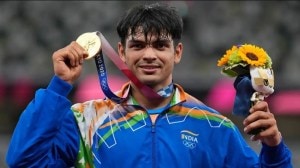Mamata8217;s maha mistake
Mamata Banerjee had almost hit the jackpot when she quit the Vajpayee ministry on the price hike issue. But she lost it all with one swift...

Mamata Banerjee had almost hit the jackpot when she quit the Vajpayee ministry on the price hike issue. But she lost it all with one swift stroke, Kaun Banega Crorepati style, with her decision to withdraw her resignation.
She has always had a soft corner for Atal Bihari Vajpayee. But it was not the Prime Minister8217;s persuasion which made her give in. A hard headed politician, Mamata decided to return to the cabinet to keep her party intact. Four of her MPs had rebelled against her for resigning. In fact, they were contemplating staying on in the NDA, if she exercised the option of withdrawing support to the NDA Government. No wonder, her lieutenant Sudip Bandhopadhyaya has put out an edict that no Trinamool MP will meet the Prime Minister without the clearance from quot;Didiquot;.
By threatening to pull out on a popular issue of quot;rozi, rotiquot;, for a while she had struck a chord with the people. She would have gained at the expense of the BJP, the CPM and the Congress, in West Bengal, even if it would have meant reducing by half her strength in the Lok Sabha. It would not have brought down Vajpayee8217;s government although it would have increased his headaches. By resigning and withdrawing Mamata made the biggest mistake of her political career. This is bound to affect her bid for the Writers Building.
Let us look at the objective conditions before she resigned: The BJP is on a downslide in several states. The economy which had been doing well until March this year is on the decline. Industrial growth is slowing down, leading to large-scale unemployment. With the opening up of 600 commodities in March this year, crisis has hit agriculture. Cheap imports have brought down the prices of edible oil, tea, and rubber. There is a similar threat to milk production and horticulture. As it is suicide deaths by farmers have taken place in several parts of the country. The budgetary crisis has reduced Government8217;s capacity to mitigate people8217;s suffering.
The oil sector has taken a turn for the worse with the increase in the international price of crude. The sudden spurt in the petroleum prices came as the last straw, hitting people hard.
Although there is discontent, in the absence of any political party taking up public issues, that disenchantment has stayed amorphous. The Congress appears confused on the economic front. It should have opposed the price hike even in a token manner.
Mamata had struck with a certain alacrity. She had threatened to put the Left on the mat. Soon after dubbing her move as a political gimmick, they were forced to go on the defensive. She knew that she, and not the BJP, would be the butt of the Communists8217; attack in West Bengal for a decision which may be unavoidable now but which was bound to be seen as anti-poor. She had hoped that the PM would have no option but partially to roll back theprices. Additionally, she would have demonstrated her clout with the Centre.
For complete two-and-a-half days Mamata symbolised people8217;s hardships. Over the years, dressed in her crumpled white cotton sari with no makeup, with her lower middle class home in Calcutta, and by wading through floods, and bybraving physical violence, and being ever ready to resign from her ministership she has indeed given voice to the voiceless. Even with a penchant for the dramatic she provided leadership to the poor.
Retracing her steps has not just brought her back to square one. It has hurt her brand image 8212; an ability to identify with the causes of the poor and the deprived. The resignation-withdrawal drama showed her in a poor light: as one more politician who plays with people8217;s sentiments.
Mamata still appears undecisive about her political alignments in West Bengal. Her indecisiveness made her play safe: return to the cabinet. In her mind she had fixed the year end as the cut off date, by which she would havedecided one way or the other. But the price hike seemed too good an opportunity to miss.
Breaking with the BJP, and aligning with the Congress, would give her the advantage of the minority votes, which constitute almost a quarter of the electorate in West Bengal. The alliance with the Trinamool would also have strengthened the Congress. Since she broke from the parent Congress, she has gained only at the Congress8217; expense. Staying with the BJP would rob her of the Muslim votes, which then would switch towards her main opponent, the Left Front.
Mamata shied away from the third option, the only one which would have provided her with an opportunity to lead. This would have helped widen her base. The problem is that she saw the Godsend opportunity only in the limited sense of a petro-price hike. If she would have seen beyond her short-term interest, she would not have withdrawn.
Since she broke from the parent Congress, she has gained only at the Congress8217; expense
- 01
- 02
- 03
- 04
- 05































